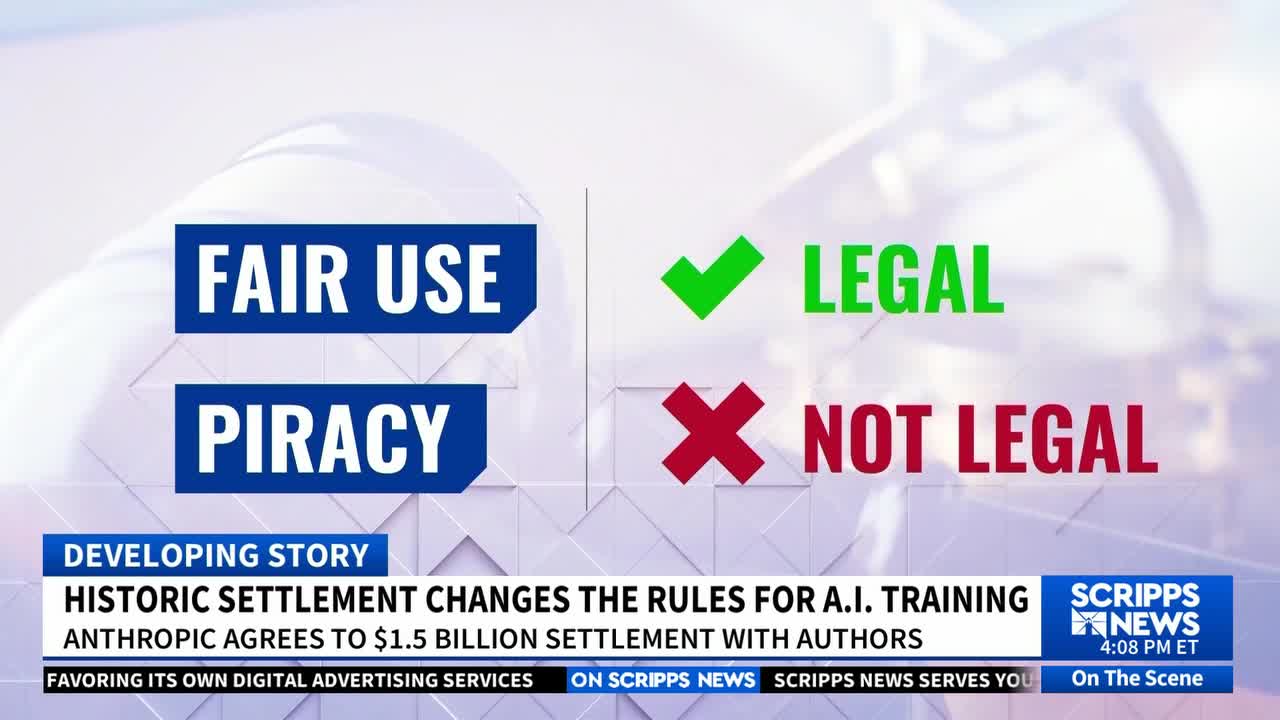AI startup Anthropic will pay a $1.5 billion settlement after being accused of copyright violations and piracy — a case that legal experts say is a first-of-its-kind, that "will be known by its first name to law students for a long time."
Well-known authors Andrea Bartz, Charles Graeber, and Kirk Wallace Johnson sued the company over what their lawyer calls "brazen infringement."
They alleged, according to the complaint, that "Anthropic downloaded known pirated versions of the works, made copies of them, and fed those pirated copies into its models" to train them.

"Anthropic is arguing, 'no, this was a transformative work under copyright law.' And transformative just means that the final product is completely different, that it's not infringing on your original work. But then the authors argue, 'but it was our work that created it,'" Nouvelle Gonzalo, who specializes in corporate law, covering intellectual property and copyright, tells Scripps News.
The judge ultimately sided with Anthropic on the copyright issue, finding the company’s usage counted as “fair use” and was therefore legal. But he also ruled that downloading them from a shadow library online constituted piracy.
This case is "the unique combination of sophistication and maybe stupidity," JD Harriman, partner at Foundation Law Group, told Scripps News. "Everyone knows [piracy] is wrong. I mean, ever since LimeWire and pirated copies of songs, everyone knows what that is wrong."
"This landmark settlement far surpasses any other known copyright recovery," said Justin Nelson, an attorney for the plaintiffs, in a statement to Scripps News. "It is the first of its kind in the AI era. It will provide meaningful compensation for each class work and sets a precedent requiring AI companies to pay copyright owners. This settlement sends a powerful message to AI companies and creators alike that taking copyrighted works from these pirate websites is wrong."
RELATED STORY | Study says AI chatbots need to fix suicide response, as family sues over ChatGPT role in boy's death
Anthropic, in a statement responding to the news of the settlement, held firm to the court's ruling that the company's approach "to training AI models constitutes fair use."
"Today's settlement, if approved, will resolve the plaintiffs' remaining legacy claims," said Aparna Sridhar, Deputy General Counsel for Anthropic, in a statement to Scripps News. "We remain committed to developing safe AI systems that help people and organizations extend their capabilities, advance scientific discovery, and solve complex problems."
However, Anthropic disagrees with the court's ruling that a downloaded work can be separated from its subsequent use. The company did not respond to Scripps News' specific request asking if Anthropic sought legal guidance prior to downloading the authors' work.
A hearing is set for Monday for a judge to approve the settlement.
Under U.S. copyright law, damages start at $750 per infringed work, meaning Anthropic could have faced more than a trillion dollars in penalties.
"A lot of people want to make new law just for AI, but the old laws work," said Harriman. "And they work in this case. This is just standard copyright violation of unlawful copying or buying pirated material."
For creators, authors, musicians — anyone who creates and publishes work online or in physical form — Gonzalo recommends they register their work to officially protect it.
“If your work is not registered, you don’t even have a fighting chance,” Gonzalo said. “Once you do register it, pay attention to how it’s being used.”
She suggested using Google Alerts, and noted there are specific software to sign up for to track if someone is using your work without permission.
The big question as AI companies continue train their LLM models is how creators and authors will be compensated; legal experts who spoke with Scripps News speculated licensing agreements or even a royalty payment setup may need to be explored.




